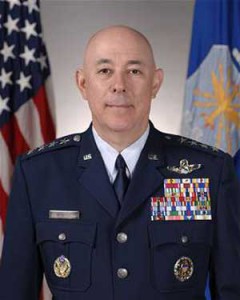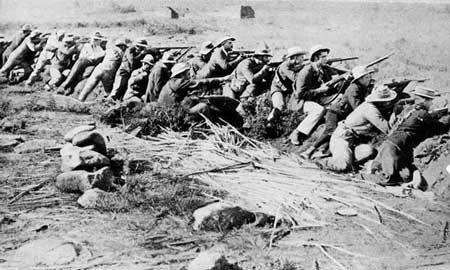
06/07/2011 – General Moseley is a widely respected as an airpower thinker, leader and commander in Israel. His years of service dealing with the Middle East are recognized for what they are, practical experiences in shaping an effective end game.
The General provided a wide ranging and thoughtful look at the challenges facing the future of U.S. and allied air dominance. And there was a clear sense of urgency in his consideration of the future of airpower and concern for the impact of current COIN thinking on downsizing airpower to an Army support function.
But rather than to replicate and probably inadequately the scope of his talk, I would like to highlight two thrusts of his presentation.
First, he warned against relying upon superficial “knowledge” and hopes in guiding airpower development decisions. He underscored that what I have called the “no sense of urgency approach” to airpower is really no less than creating the grounds for a massive strategic failure.
He catalogued some lessons learned from history to reinforce his point.
- WWI (German fielding of Fokker Eindecker & DVII changed the game), Interwar Period (cancelation of German long range bomber decisively limited German employment – “loss of Battle of Britain in mid-1930s?) & WWII (German Me262 & V-Series Rockets potentially game changers).
- Korea (Soviet Mig15 changed the game) & SEA (Soviet Maneuverable fighters / Soviet SAMs…loss of ½ of all F-105s produced & lack of historic kill ratios).
- Post-SEA examples (67’, 73’, Falklands, Iraq I, Bosnia & Kosovo, 10+ years of NFZs, Afghanistan & Iraq II).
- Failure to understand changing environment, accept strategic setting, realities or the failure to apply lessons learned – costly in live / treasure & failure prone.
- Desire to “kill” Spitfire by politicians due to “complexity” & “cost” would have fundamentally changed outcome of Battle of Britain, as Hurricanes were effectively performance limited to – 18K & below.
- Desire to “kill” German long range / 4-engine bomber in mid – 1930s by politicians & “experts” due to “complexity” & desire to tie Luftwaffe more closely with Army – fundamentally changed German ability to hold activities & targets at risk across the UK & Russia…providing each operational & logistic sanctuaries to build, repair, refit & train forces.
- Desire by “experts” to build conventional, straight-wing fighters vice the swept-wing F-86 due to “complexity” & concern over “new” technology would have fundamentally changed outcome of Korean Conflict – as control of peninsula would have been near impossible under massive, hostile air campaign & loss of ROK would have been an much different dynamic in “Cold War”
- Desire to “kill” F-15 by politicians & OSD program ”experts” due to complexity & “cost” would have fundamentally changed outcome of combat since SEA (100+ to 0 kill ratio – highest in history).
- Desire to “kill” F-22 by politicians & OSD program “experts” due to complexity & “cost” has not fully played out…alternatives limited in altitude & speed as well as potential survivability challenges.
- Additional decisions by politicians & “experts” that have not fully played out include: continued delay of fielding aerial tanker, continued delay of fielding survivable / mission capable CSAR helicopter, continued delay in fielding mission capable satellite & launch systems…as well as continued delay in fielding next generation, penetrating long range strike a/c (bomber).
 F-86 in Flight (Credit: http://www.militaryfactory.com/aircraft/detail.asp?aircraft_id=120)
F-86 in Flight (Credit: http://www.militaryfactory.com/aircraft/detail.asp?aircraft_id=120)
Second, he warned against building too specialized a force, and here had in mind the overinvestment in COIN capabilities, when the world is so uncertain. He argued for multi-mission, full spectrum forces to shape future capability. And he argued that the 5th generation aircraft should be understood in this sense, rather asserting as many do that these capabilities are highly specialized and designed to operate only on the high-end threat spectrum.
Leadership (civilian & uniformed) must realize that forces organized, trained & equipped to focus on only a portion of the spectrum, i.e. – irregular warfare, COIN or counter-terrorism potentially become useless…even in those applications without ability to capture & maintain aerial dominance.

He provided the example of the Boer war and the irrelevance of that experience to the combat capability, which England would then need in WWI.
England eventually deployed 400,000 troops into South Africa to fight Boars at end of 19th Cent…convincing themselves that COIN ops / irregular warfare was the future. Their organizations, training & equipage was focused on COIN resulting in serious challenges & losses a decade later in the trenches of Belgium when a most lethal opponent (Germany) decided to fight a conventional fight, on a global scale.
Strategic failure is inevitable with such an approach.
Failure to grasp the requirements of full spectrum operations will result in traditional forces / equipment employed in COIN or irregular missions within non-permissive scenarios also become useless with opponent’s fielding of next generation IADS (Vulnerability of UAVs, cargo/mobility, helo, C2/ISR systems, etc. – highlighted against latest fighter & SAM employment).
And he warned that hope is not a “plan for defending our people against a most uncertain future.”
Contemporary decisions must be tempered with actual combat experience & a truthful assessment of potential threat systems & truthful mission area analysis – to balance acquisition of “full spectrum” capabilities & capacities…and, not be lulled into a “hopeful” strategic setting or the latest “fad” (proliferation of UAVs, COIN specific a/c, unique anti-IED vehicles, etc.).
(Credit: http://www.infobarrel.com/Impact_of_the_Boer_War_on_British_politics_and_society_in_the_twentieth_century)

